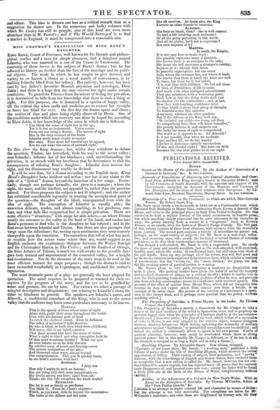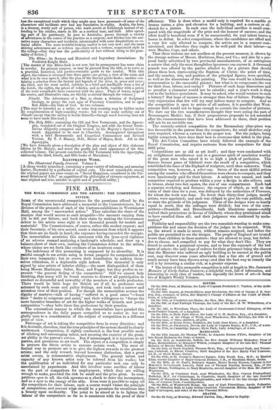PUBLICATIONS RECEIVED.
From August 22C to August MS.
BOOKS.
Scenes on the Shores of the Atlantic. By the Author of " Souvenirs of a Summer in Germany," &c. In two volumes.
Journals of Expeditions of Discovery into Central Australia, and Over- land from Adelaide to King George's Sound, in the years 1840-.1; sent by the Colonists of South Australia with the sanction and support of the Government: including an Account of the Manners and Customs of the Aborigines and the state of their relations with Europeans. By Ed- ward John Eyre, Resident Magistrate, Murray River. In two volumes.
Memorials of a Tour on the Continent; to which are added, Miscellaneous Poems. By Robert Snow, Esq. [Mr. Snow spent nearly a twelvemonth in 1843-44 on a Continental tour, which extended from Boulogne to Mount Etna, embracing Paris, Lyons, a descent of the Rhone, and visits to the principal places in Italy from Venice to Naples. On this excursion he kept a regular journal of the usual occurrences, in humble prose; but when anything deeply impressed him ho gave utterance to his thoughts in song; the poems varying from a sonnet to a " fragment," such as Byron's Dream, or an epistle, after the fashion of Moore's Fudge Family. The first wt of this volume consists of these local effusions, with extracts from the traveller'; prose journal. The second part contains a variety of miscellaneous poems: not, perhaps, on the usual variety of subjects; for Mr. Snow is a well-read, reflec- tive, and observing man, who avoids the hacknied or trivial themes of common poetasters, as he does their commonplace manner of treatment. But though a well-studied, Mr. Snow is only a respectable poet. He excels the mass of puny and puerile versifiers, just as the well-educated, well-exercised, healthy man, excels the sickly, ill-conditioned lout; but still stops very short of the god Apollo. Take up any, perhaps all of his verses, you will find good and by no means common ideas expressed in harmonious lines, which exhibit a mastery of versification; but the " vivida via," the "mans divinior," the grasp, the fire, the life-creating power of poetical genius, is wanting. Mr. Snow's prose is very good, excepting a tendency to disquisition not quite in place. His poetical studies have given the habit of seeing the imagery and essential character of things, as a critical faculty; whilst it enables him to note the distinguishing traitsand informing qualities of what he sees, and prevents him from echoing commonplace praise in compliance with received opinion. His account of the effect of sunrise from Mount Etna, which did not disappoint him because he does not expect much from sunrise seen from a height, is an example of the latter class. His picture of the convicts at Castelmare is a speci men of the former kind, and is perhaps more poetical than his poetry, without anything stilted.] The Purgatory of Suicides; a Prison-Rhyme, in ten books. By Thomas Cooper, the Chartist_ [ThePurgatory of Suicides is merely a framework for Mr. Cooper to take a review of the past condition of the world in Spenser:an verse, and to prophesy its probable happy state when the principles of Chartism shall be in the ascendant should such a time ever arrive. The plan of the work, which is that of a succession of visits to Hades, is not well adapted to the writer's object, because dialogues between shadowy beings—as Mark Antony upholding the monarchy of mihtary adventurers against "legitimate" or patriarchal monarchy—are too artificial; and indeed the author is continually driven to speak in his own person. Faults of poetical planning, however, may easily be overlooked where there is t
poetical power: but in this quality Mr. Cooper is deficient, or if he has it at his strength is unequal to so long a flight and so lofty a theme.] Rambling Rhymes. By Alexander Smart. New edition, enlarged. [Upwards of ten years since, Mr. Smart, " a working man," published a little volume of poems under the title of Rambling Rhymes, which received the cordial approbation of Jeffrey. Their variety of subject, their animation, and " pawky* humour, with the interchange of English and Scotch dialect, have rendered them
so acceptable that a new edition is called for. Mr. Smart, however, has not con- fined himself to a mere reprint, but has rejected many old poems that his matures taste disapproves of, and inserted some new ones: among the latter will be found a lively little ode on the birth of the Prince of Wales, complimentary without canting.] Arabin; or the Adventures of a Colonist in New South Wales. With at Essay on the A'nes of Australia. By Thomas M'Combie, Editor of
the " Port Phillip ," &c.
[Arabia is an attempt to depict colonial his and character by means of fiction: but the attempt is not very successful. The exceptions are taken for Mr. M'Combie's materials; and even these are heightened by literary arts, till they lose the exceptional truth which they might once have possessed—if some of the characters and incidents ever had any foundation in reality. Arabin, the hero, is a dreamy, wordy sort of person, who reads novels at Edinburgh instead of at- tending to his studies starts in life as a medical man, and fails. After spend- ing part of his patrimony, he goes to Australia; passes through a variety of adventures in the course of his practice as a surgeon; and hitches into his nar- rative many characters and incidents, intermingled with some disquisitions on co- lonial affairs. The more truthful-looking matter is not very new; and the more stirring adventures are so written rip--have such a verbose, magazinish style in the telling—that they lose the particularity of fact without rising to the gene- rality of fiction.]
The Rhine: its Scenery and Historical and Legendary Associations. By Frederick Knight Hunt.
[The matter of this Rhine-book is not new, but its arrangement has some claim to novelty. Its primary purpose, as may be guessed from the title, is to serve as a practical, historical, and poetico-romantic guide to the tourist. With this object, the volume is arranged into three parts; one giving a view of the route and what is to be seen upon it, after the plan of the literary guide-books; another con- taining a selection from the history and legends of the river, in prose and verse; the third, and the most useful, exhibits in a brief and intelligible form a list of the hotels, the sights, the prices of vehicles, and so forth, together with a precis of the most remarkable facts connected with the place. Plans of towns, maps of the routes, and illustrative cuts, are thickly scattered through the volume.]
Nimshi. The Adventures of a Man to obtain a Solution of Scriptural Geology, to gauge the vast ages of Planetary Concretion, and to open Bab Allah—the Gate of God. In two volumes.
This may be intended as a satire, or some deep meaning may be hidden under its conglomeration of high-sounding words; but we can make nothing out of Nimshi except that the author is beside himself,—though much learning does not seem to have made him mad.] The Holy Bible; containing the Old and New Testaments, and the Apocry- pha, translated out of the Original Tongues, and with the former Trans- lations diligently compared and revised, by his Majesty's Special Com- mand. Appointed to be read in Churches. Accompanied throughout with a brief Hermeneutic and Exegetical Commentary and Revised Version. By T. J. Hussey, D.D., Rector of Hayes, Kent. Job to the Apocrypha. [We have formerly given a description of the plan and object of this elaborate edition by Dr. Hussey, and noted the goodly and staid appearance of the first collected volume. The present concludes the Old Testament with the Apocrypha, embracing the third, fourth, and fifth books of Maccabees.]
ILLUSTRATED WORK.
The Illustrated Family Journal. Volume L [A cheap weekly miscellany, containing a great variety of informing and amusing matter, illustrated by a profusion of capital cuts. The most remarkable among the original papers are some essays on Social Happiness, considered in the Per- sonal Relations of Life;" an exposition of the philosophy of virtuous enjoyment, at Once original and true, amiable in spirit and of practical utility.]



























 Previous page
Previous page